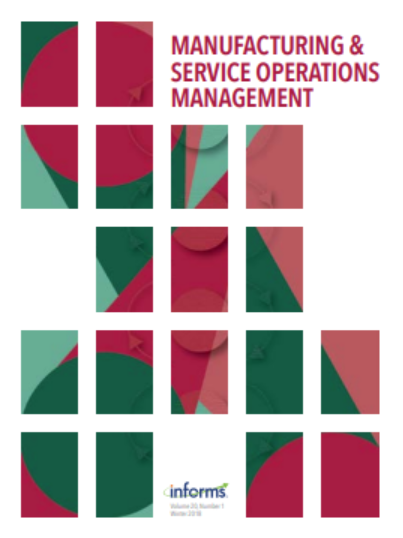云计算价值链:运营管理视角下的研究
IF 4.8
3区 管理学
Q1 MANAGEMENT
M&som-Manufacturing & Service Operations Management
Pub Date : 2023-07-01
DOI:10.1287/msom.2022.1178
引用次数: 3
摘要
问题定义:云计算被认为是信息技术支持的创新的关键驱动因素。然而,运营管理(OM)社区还没有充分暴露于云价值链管理所产生的基本运营问题。学术/实践相关性:在本文中,我们研究了最近关于云价值链的研究,并从OM的角度探讨了未来的研究机会。我们特别关注云提供商在三个问题领域面临的主要运营管理挑战:(1)云计算资源管理,(2)云计算市场定价,以及(3)云供应链的容量规划和管理。方法论:我们描述了云价值链中流行的业务模型和管理实践,讨论了OM在上述三个问题领域的最新研究,并指出了未来研究的机会。结果:我们注意到,云计算操作是由需求驱动的,这些需求表现出不同的特征,包括复杂的工作流程、需求冗余、多特征特征、多维资源需求和非平稳性。在供应方面,云计算操作也表现出不同的特征,包括异构资源、打包约束、预配置(“捆绑”)供应、技术风险和成本不确定性。这些需求和供应的特点在其他业务中并不普遍。管理启示:云计算操作不仅与传统的管理问题有许多共同的特点,而且还带来了新的挑战和创新的业务模式。因此,云计算工具和研究有可能为云计算操作和影响云计算行业的管理实践提供重要见解,这反过来又可以从云计算的角度激发许多创新研究。补充材料:在线附录可在https://doi.org/10.1287/msom.2022.1178上获得。本文章由计算机程序翻译,如有差异,请以英文原文为准。
Cloud Computing Value Chains: Research from the Operations Management Perspective
Problem definition: Cloud computing is recognized as a critical driver of information technology–enabled innovations. The operations management (OM) community, however, has not been exposed enough to the essential operations problems that arise from the management of cloud value chains. Academic/practical relevance: In this paper, we examine recent research on cloud value chains and explore future research opportunities from an OM perspective. In particular, we focus on major operations management challenges facing a cloud provider in three problem domains: (1) cloud computing resource management, (2) pricing in the cloud computing marketplaces, and (3) capacity planning and management of cloud supply chains. Methodology: We describe prevalent business models and management practices in the cloud value chains, discuss recent research from OM that falls into each of the three problem domains mentioned, and point out opportunities for future research. Results: We note that cloud computing operations are driven by demand that exhibits distinct characteristics, including complex workflow, demand redundancy, multifeatured characteristics, multidimensional resource requirement, and nonstationarity. On the supply side, cloud computing operations also exhibit distinct characteristics, including heterogeneous resources, packing constraints, preconfigured (“bundled”) supply, technology risks, and cost uncertainty. These characteristics of demand and supply are not all prevalent in other operations. Managerial implications: Cloud computing operations not only share many features with classic OM problems, but also bring new challenges and innovative business models. Thus, OM tools and research have the potential to provide vital insights into cloud computing operations and impact management practices in the cloud industry, which, in turn, can stimulate much innovative research from the OM perspective. Supplemental Material: The online appendix is available at https://doi.org/10.1287/msom.2022.1178 .
求助全文
通过发布文献求助,成功后即可免费获取论文全文。
去求助
来源期刊

M&som-Manufacturing & Service Operations Management
管理科学-运筹学与管理科学
CiteScore
9.30
自引率
12.70%
发文量
184
审稿时长
12 months
期刊介绍:
M&SOM is the INFORMS journal for operations management. The purpose of the journal is to publish high-impact manuscripts that report relevant research on important problems in operations management (OM). The field of OM is the study of the innovative or traditional processes for the design, procurement, production, delivery, and recovery of goods and services. OM research entails the control, planning, design, and improvement of these processes. This research can be prescriptive, descriptive, or predictive; however, the intent of the research is ultimately to develop some form of enduring knowledge that can lead to more efficient or effective processes for the creation and delivery of goods and services.
M&SOM encourages a variety of methodological approaches to OM research; papers may be theoretical or empirical, analytical or computational, and may be based on a range of established research disciplines. M&SOM encourages contributions in OM across the full spectrum of decision making: strategic, tactical, and operational. Furthermore, the journal supports research that examines pertinent issues at the interfaces between OM and other functional areas.
 求助内容:
求助内容: 应助结果提醒方式:
应助结果提醒方式:


